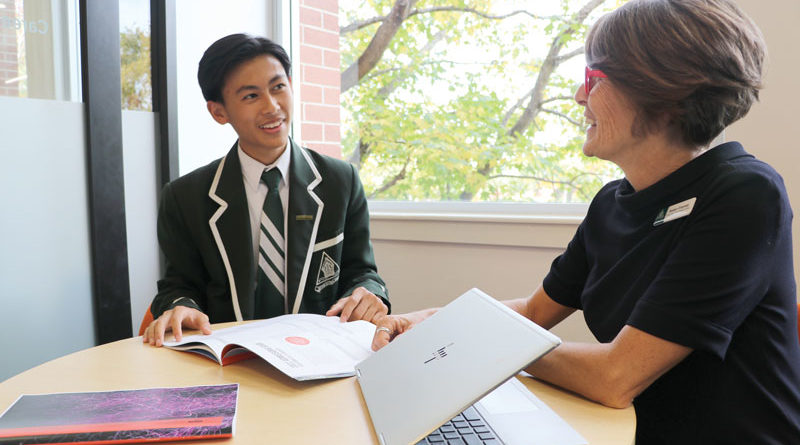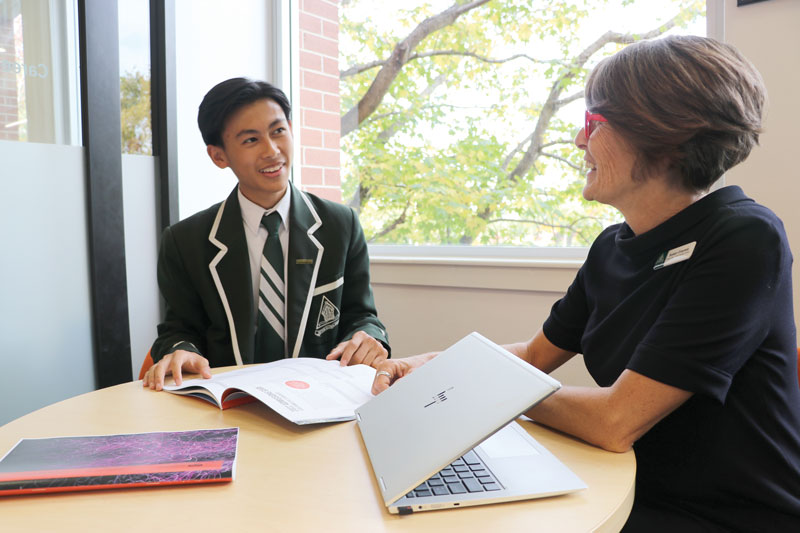Ready for anything
Life is unpredictable. Trinity’s Careers and Student Pathways Advisor, Ms Sue Draysey is committed to making sure every Trinity student has the tools they need to navigate any challenge that comes their way.
Careers advisors have always been dedicated to preparing students for whatever pathway they will take when they leave school. The transition is a significant one in ordinary times, but for last year’s Year 12 students, it was a particularly bumpy ride with remote learning disrupting their final year of school and dashing their hopes of final year celebrations before they headed out into a working world that has been forever changed by the effects of COVID-19.
“They experienced a disruption in the way that they learn,” Ms Sue Draysey, Careers and Student Pathways Advisor, explained. “But it was more about their headspace being disrupted than anything. When you’ve built resilience, it makes those challenges easier to handle and it opens up the opportunity to thrive.”
Their experience has inspired Ms Draysey to tackle a new approach in getting Trinity students ready for the world after school.
“Preparing students for the future is about the process and the conversation working together. It isn’t enough to just share information about how to and when to – students need to talk about their goals, plans, and ideas with someone. When they do this, it helps them recognise what they already know and identify what they need to find out.”
Ms Draysey supports students as they use an approach similar to creating a ‘mood board’ to shape their own learner profile to better understand themselves and how they might present themselves in a competitive market for a place in a course, for a scholarship, or for a job. To do this, she has developed a tool based on the Johari Window concept, prompting students to reflect on what they know about themselves and how this will help them compete for employment after their post school study. Ms Draysey uses the following terms to guide the conversation:
- Known knowns (I know what I know) – current and past subjects, post-school qualifications are important, parents’ ambitions, courses I might like to study, where I might like to study, skills, interests.
- Known unknowns (I know what I don’t know) – course application processes, course prerequisites, whether or not the course will be enjoyable.
- Unknown knowns (I don’t know what I know) – hidden skills, understanding underlying motivations/feelings
- Unknown unknowns (I don’t know what I don’t know) – accepting that there is plenty about the world I do not know and I won’t know it until I come up against it.
It may seem like an elaborate tongue twister, but it’s a great way to take stock of everything going on, especially as students head into a time of transition where new ideas will be thrown their way weekly, if not daily. It’s a method to help students understand where they’re at, where they might like to go and how they might get there.
“It’s important for students to be considering themselves through their own learner profile,” Ms Draysey says. “By the end of the exercise, we want students to reflect and increase the information they can store in the ‘I know what I know’ section of their learner profile.”
“Together, we look at things logically, taking in all the facts as well as the emotional side of things. We decide on a goal and work out how students will get there, taking it one step at a time. Whatever the student needs at the time, we map out something that’s right for them. It’s a bespoke careers service.”
And it’s not just about the ATAR either. There are so many different pathways students can take, each as unique as the students themselves, and Ms Draysey encourages all students to consider all their options at every crossroads instead of pigeon-holing themselves into one fixed idea.
Creating a learner profile is all about giving students a tool they can use whenever applications or opportunities arise – whether that be for a course, a job, or an internship. The tool equips students to know their own skills and goals so that they’re not worried about where to start and, instead, are ready and confident to seize any opportunity that comes their way.
Future-proof planning
Ms Draysey sat down with Nicholas N. to understand how a more structured approach to planning his future has helped him so far.
Do you have plans for post school study and work?
I’ve been researching information and have an idea of what university I want to go to and what course I want to study. I also have a vision of what my career may entail and where I see myself in a few years’ time. Having said that, I also have a plan b, c and d! I don’t know if I will like the course until I start, so I have some alternative options in mind but still they link to my ideas about what my career will look like.
What has helped you come up with your plan?
Definitely having conversations and listening to others’ thoughts on the courses that I am interested in. I read blogs and websites where questions about university courses are asked and a range of people will answer. At this stage, I don’t know about the courses, other than what the universities publicise, so being part of conversations about options is really important.
What are you doing with all this knowledge that you are gaining?
I keep links to sites and articles in folders on my laptop. Each folder fits with my timeline approach to when I will need it – a folder for what I will need to make decisions about courses, a folder about career options etc. A lot of it is in my head, too! My IB CAS portfolio is also a good resource.
In our session about the Careers Mood Board, students were asked to think about building a bank of knowledge that will help them with courses, scholarships, or job applications. What are your thoughts about this?
I am kind of doing this already, and I can see that structuring my thinking around what I know and what I need to know will be helpful. I think next year will be the time when I will start drawing on information I have stored, to respond to questions that may be part of different applications. In Year 12, I will spend some time preparing information based on my own reflections on my interest in the courses I want to apply for. I might explore some micro-credential courses that we looked at in the session, too, to expand my thinking. The more I know about myself and the courses I want to apply for, the better.


















